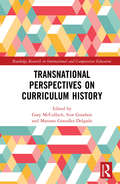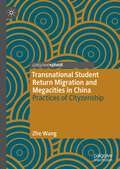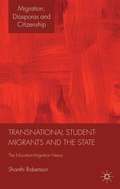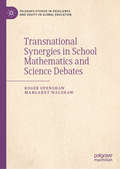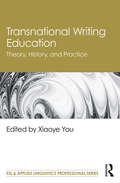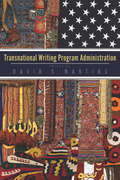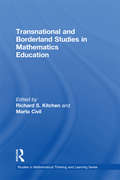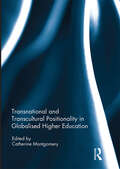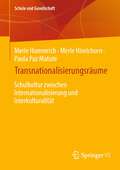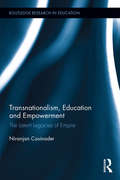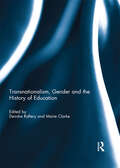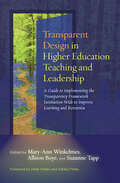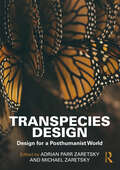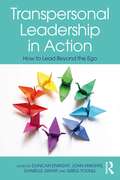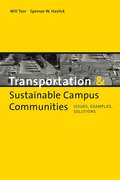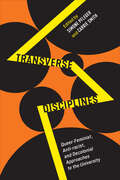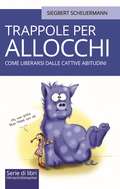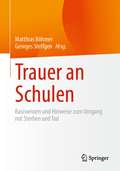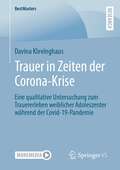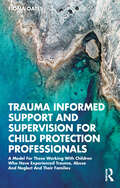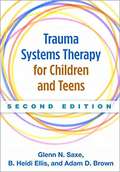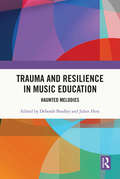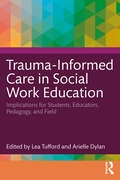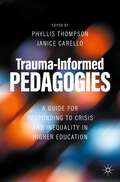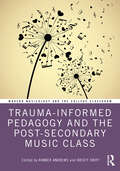- Table View
- List View
Transnational Perspectives on Curriculum History (Routledge Research in International and Comparative Education)
by Ivor Goodson Gary McCulloch Mariano González-DelgadoThis book offers a remarkable range of research that emphasises the need to analyse the shaping of curricula under historical, social and political variables. Teachers’ life stories, the Cold War as a contextual element that framed curricular transformations in the US and Europe, and the study of trends in education policy at transnational level are issues addressed throughout. The book presents new lines of work, offering multidisciplinary perspectives and provides an overview of how to move forwards. The book brings together the work of international specialists on Curriculum History and presents research that offers new perspectives and methodologies from which to approach the study of the History of Education and Educational Policy. It offers new debates which rethink the historical study of the curriculum and offers a strong interdisciplinary approach, with contributions across Education, History and the Social Sciences. This book will be of great interest for academics and researchers in the fields of education and curriculum studies. It will also appeal to educational professionals, teachers and policy makers.
Transnational Student Return Migration and Megacities in China: Practices of Cityzenship
by Zhe WangThis book is a study of the return migration of overseas Chinese students. By 2018, over 3.5 million Chinese students had returned from overseas universities to China, with the megacities of Beijing, Shanghai, and Shenzhen representing by far their main destinations. In other words, when overseas students return to China, many do not return to their hometown but usually land, work and settle down in Beijing, Shanghai and Shenzhen. Their return migration is thus not only transnational, but also internal-urban. This book adopts a multi-level geographical analysis to explore this important phenomenon, exploring why and how returnees choose these three cities and how they experience and interpret their everyday lives in these megacities after their return. In doing so, it highlights the importance of cultural logics and multiscalar thinking of transnational Chinese students’ return migration and illuminates how their transnational migration reproduces domestic socio-spatial inequalities. This book brings an important contribution to the fields of Cultural Geography, Urban Geography, Transnationalism, Migration Studies and Citizenship Studies.
Transnational Student-Migrants and the State
by Shanthi RobertsonInternational students are often engaged not just in education, but in high stakes towards gaining permanent migration status. This book unpacks the consequences of this education-migration nexus, analyzing migration policies and providing a vivid picture of student-migrants' lived experiences.
Transnational Synergies in School Mathematics and Science Debates (Palgrave Studies in Excellence and Equity in Global Education)
by Margaret Walshaw Roger OpenshawThis book highlights and interrogates the continued interest and scrutiny of mathematics and science education. National debates on excellence and equity tend to focus largely on underachievement in mathematics and science rather than subjects in the arts or music: this is due to a belief that these curriculum areas are central to individual workplace success and national development in a competitive economic environment. The authors explore the history of these assumptions, as well as the debates based around claims that student achievement levels in these subjects has fallen. Spanning the United States, New Zealand, Australia and the United Kingdom, the chapters question how such debates are sustained and amplified: how has this perceived ‘crisis’ been articulated and spread across national borders? This comprehensive book will be of interest and value to scholars of mathematics and science education, as well as international education debates.
Transnational Writing Education: Theory, History, and Practice (ESL & Applied Linguistics Professional Series)
by Xiaoye YouArguing that writing teachers need to enable students to recognize, negotiate with, deconstruct, and transcend national, racial, ethnic, and linguistic boundaries, this volume proposes a "transnational" framework as an alternative approach to literacy education and as a vital component to cultivating students as global citizens. In a field of evolving literacy practices, this volume builds off the three pillars of transnational writing education—translingualism, transculturalism, and cosmopolitanism—and offers both conceptual and practice-based support for scholars, students, and educators in order to address current issues of inclusion, multilingual learning, and diversity.
Transnational Writing Program Administration (G - Reference, Information And Interdisciplinary Subjects Ser.)
by David S. MartinsWhile local conditions remain at the forefront of writing program administration, transnational activities are slowly and thoroughly shifting the questions we ask about writing curricula, the space and place in which writing happens, and the cultural and linguistic issues at the heart of the relationships forged in literacy work. Transnational Writing Program Administration challenges taken-for-granted assumptions regarding program identity, curriculum and pedagogical effectiveness, logistics and quality assurance, faculty and student demographics, innovative partnerships and research, and the infrastructure needed to support writing instruction in higher education. Well-known scholars and new voices in the field extend the theoretical underpinnings of writing program administration to consider programs, activities, and institutions involving students and faculty from two or more countries working together and highlight the situated practices of such efforts. The collection brings translingual graduate students at the forefront of writing studies together with established administrators, teachers, and researchers and intends to enrich the efforts of WPAs by examining the practices and theories that impact our ability to conceive of writing program administration as transnational. This collection will enable writing program administrators to take the emerging locations of writing instruction seriously, to address the role of language difference in writing, and to engage critically with the key notions and approaches to writing program administration that reveal its transnationality.
Transnational and Borderland Studies in Mathematics Education (Studies in Mathematical Thinking and Learning Series)
by Richard S. Kitchen Marta CivilEvery year, significant numbers of immigrant children from Mexico enter classrooms in the United States. These immigrants comprise a heterogeneous group of students with diverse needs, abilities, and experiences. Transnational and Borderland Studies in Mathematics Education is the first collection to offer research studies across these communities. Providing invaluable research on both sending and receiving communities in Mexico and the US, this collection considers the multiple aspects of children’s experiences with mathematics, including curriculum, classroom participation structures, mathematical reasoning and discourse – both in and out of school – and parents’ perceptions and beliefs about mathematics instruction. An important treatment of an insufficiently documented subject, this collection brings together researchers on both sides of the border to foster and support an interest in documenting evidence that will set the stage for future studies in mathematics education.
Transnational and Transcultural Positionality in Globalised Higher Education
by Catherine MontgomeryTransnational higher education (TNHE), where students study on a ‘foreign’ degree programme whilst remaining in their home country, has seen exponential development over the last decade. In addition to the increase in students engaged in TNHE across the globe, the involvement of university teachers in TNHE has also risen in response to the demand for this form of international education. Although research into transnational education has doubled since 2006, there is a paucity of research focusing on transnational teacher education, especially outside of North America. The global nature and scope of the expansion of TNHE remains underexplored, and the ways in which different countries are realising TNHE provision is little understood. This book explores the experiences and perceptions of teachers in transnational higher education, interrogating the ways in which university teachers negotiate cultural, linguistic, and disciplinary contexts in order to provide transformative learning experiences for their students. This book was originally published as a special issue of the Journal of Education for Teaching.
Transnationalisierungsräume: Schulkultur zwischen Internationalisierung und Interkulturalität (Schule und Gesellschaft #65)
by Merle Hummrich Merle Hinrichsen Paula Paz MatuteDas Buch zeigt die pädagogische Bedeutung von Globalisierungsprozessen in der Institution Schule. Diese lässt sich anhand von zwei Dimensionen markieren: der Internationalisierung von Schule und der Relevanz von ethnischer Diversität. Wie sich Schulkulturen auf diese Prozesse beziehen und wie sie damit einhergehende Anforderungen bearbeiten, wird theoretisch mit dem Konzept der Transnationalisierung aufgeschlüsselt. Zudem wird herausgearbeitet welche Möglichkeitsräume für Bildungsteilhabe sich in diesem Zusammenhang für Jugendliche eröffnen.
Transnationalism, Education and Empowerment: The Latent Legacies of Empire (Routledge Research in Education)
by Niranjan CasinaderTransnationalism, Education and Empowerment challenges the prevailing notion that transnationalism is concerned fundamentally with the process of enhanced global population movement that has been allied with modern globalisation. Instead, it argues that transnationalism is a state of mind, disassociated from the notion of ‘place,’ that can be observed equally in societies of the past. Drawing on the context of colonial Sri Lanka and the British Empire, the book discusses how education in the British Empire was the means by which some marginalised groups in colonised societies were able to activate their transnational dispositions. Far from being a universal oppressor of colonised people, as argued by postcolonial scholarship, colonial education was capable of creating pathways to life improvement that did not exist before the European colonial period, providing agency to those who did not possess it prior to colonial rule. The book begins by exploring the meaning of transnationalism, arguing that it needs to be redefined to meet the realities of past and current global societies. It then moves on to examine the ways education was used within the period of 18th and 19th century European colonialism, with a particular emphasis on Sri Lanka and other parts of the former British Empire. Drawing from examples of his own family’s ancestry, Casinader then discusses how some marginalised groups in parts of the British Empire were able to use education as the key to unlocking their pre-existing transnational dispositions in order to create pathways for more prosperous futures. Rather than being subjugated by colonial education, they harnessed the educational aspects of British colonial education for their own goals. This book is one of the first to contest and critically evaluate the contemporary conceptualisation of transnationalism, particularly in the educational context. It will be of key interest to academics, researchers and postgraduate students in the fields of education, the history of education, imperial and colonial history, cultural studies and geography.
Transnationalism, Gender and the History of Education
by Deirdre Raftery and Marie ClarkeIn the past decade, historians have begun to make use of the optic of ‘transnationalism’, a perspective used traditionally by social anthropologists and sociologists in their study of the movement and flow of ideas between continents and countries. Historical scholarship has adopted this tool, and in this book historians of education use it to add nuance and depth to research on gender and education, and particularly to the education experiences of women and girls. The book brings together a group of internationally-regarded scholars, who are doing important research on transnationalism and the social construction of gender, with particular reference to education environments such as schools and colleges. The book is therefore very much at the cutting-edge of theoretical and methodological advances in the history of education.This book was originally published as a special issue of the History of Education.
Transparent Design in Higher Education Teaching and Leadership: A Guide to Implementing the Transparency Framework Institution-Wide to Improve Learning and Retention (Higher Education Ser.)
by Peter Felten Mary-Ann Winkelmes Ashley Finley Allison Boye Suzanne TappThis book offers a comprehensive guide to the Transparency in Learning and Teaching (TILT) framework that has convincingly demonstrated that implementation increases retention and improved outcomes for all students. Its premise is simple: to make learning processes explicit and equitably accessible for all students. Transparent instruction involves faculty/student discussion about several important aspects of academic work before students undertake that work, making explicit the purpose of the work, the knowledge that will be gained and its utility in students’ lives beyond college; explaining the tasks involved, the expected criteria, and providing multiple examples of real-world work applications of the specific academic discipline. The simple change of making objective and methods explicit – that faculty recognize as consistent with their teaching goals – creates substantial benefits for students and demonstrably increases such predictors of college students’ success as academic confidence, sense of belonging in college, self-awareness of skill development, and persistence. This guide presents a brief history of TILT, summarizes both past and current research on its impact on learning, and describes the three-part Transparency Framework (of purposes, tasks and criteria). The three sections of the book in turn demonstrate why and how transparent instruction works suggesting strategies for instructors who wish to adopt it; describing how educational developers and teaching centers have adopted the Framework; and concluding with examples of how several institutions have used the Framework to connect the daily work of faculty with the learning goals that departments, programs and institutions aim to demonstrate.
Transpecies Design: Design for a Posthumanist World
by Michael Zaretsky Adrian Parr ZaretskyIn May 2019, the United Nations released the Global Assessment Report on Biodiversity and Ecosystem Services which warned that human activities will drive nearly one million species to extinction in a few decades. The primary reasons for this are habitat loss and biodiversity demise caused by changing climate, pollution, introducing nonindigenous species, clearing land, over population, and consumption. Given this situation, humans must change course as both human wellbeing and the wellbeing of other-than-human species are imbricated in one another. One way humanity can accomplish the needed transformation is to move beyond an anthropocentric view of life by embracing a transpecies approach that is premised upon interconnected flourishing.Transpecies design, as outlined in this book, offers a new approach to regenerating the natural environment while honoring biodiversity. Rather than presenting the human experience as the goal of design, transpecies design takes the inextricable linkages connecting living things as both its starting point and end goal. As such, it moves beyond human experience serving as the fundamental ingredient for making better design processes and decisions.This book is essential reading for artists, designers, and architects, as well as students of architecture, landscape architecture, interior architecture, art, product design, urban design, planning, environmental philosophy, and cultural studies.
Transpersonal Leadership in Action: How to Lead Beyond the Ego
by Duncan EnrightHow can leaders promote diversity, equality and inclusion? What does it mean to let go of leadership? How do learning, feedback and coaching help us become better leaders? Following the success of Leading Beyond the Ego, this book shows how to apply transpersonal leadership – practiced leaders who are radical, ethical, authentic and act beyond their own interests to create high-performing organisations – in a wide range of contexts. It considers the attributes of transpersonal leaders and how they transform organisations by building strong, collaborative relationships and a caring, sustainable and performance-enhancing environment. Shining a light on the way forward for senior leaders and HR and talent professionals, the book covers: Characteristics of transpersonal leaders such as purpose, ethics and adult development Impact of transpersonal leaders on global organisations, during digital transformation and change and through crises Case studies of transpersonal leadership in different contexts including in India and East Asia, when leading remotely, in HR and politics Transpersonal Leadership in Action is essential reading for senior leaders, HR professionals and those responsible for leader and organisational development.
Transportation and Sustainable Campus Communities: Issues, Examples, Solutions
by Spenser Havlick Will ToorColleges and universities across North America are facing difficult questions about automobile use and transportation. Lack of land for new parking lots and the desire to preserve air quality are but a few of the factors leading institutions toward a new vision based upon expanded transit access, better bicycle and pedestrian facilities, and incentives that encourage less driving. Transportation and Sustainable Campus Communities presents a comprehensive examination of techniques available to manage transportation in campus communities. Authors Will Toor and Spenser W. Havlick give readers the understanding they need to develop alternatives to single-occupancy vehicles, and sets forth a series of case studies that show how transportation demand management programs have worked in a variety of campus communities, ranging from small towns to large cities. The case studies in Transportation and Sustainable Campus Communities highlight what works and what doesn't, as well as describing the programmatic and financial aspects involved. No other book has surveyed the topic and produced viable options for reducing the parking, pollution, land use, and traffic problems that are created by an over-reliance on automobiles by students, faculty, and staff. Transportation and Sustainable Campus Communities is a unique source of information and ideas for anyone concerned with transportation planning and related issues.
Transverse Disciplines: Queer-Feminist, Anti-racist, and Decolonial Approaches to the University
by Carrie Smith Simone PflegerFor at least a decade, university foreign language programs have been in decline throughout the English-speaking world. As programs close or are merged into large multi-language departments, disciplines such as German studies find themselves struggling to survive. Transverse Disciplines offers an overview of the current research on the humanities and the academy at large and proposes creative and courageous ideas for the university of the future. Using German studies as a case study, the book examines localized academic work in Australia, Canada, the United Kingdom, and the United States in order to model new ideas for invigorated thinking beyond disciplinary specificity, university communities, and entrenched academic practices. In essays that are theoretical, speculative, experimental, and deeply personal, contributors suggest that German studies might do better to stop trying to protect existing national and disciplinary arrangements. Instead, the discipline should embrace feminist, queer, anti-racist, and decolonial academic practices and commitments, including community-based work, research-creation, and scholar activism. Interrogating the position of researchers, teachers, and administrators inside and outside academia, Transverse Disciplines takes stock of the increasingly tenuous position of the humanities and stakes a claim for the importance of imagining new disciplinary futures within the often restrictive and harmful structures of the academy.
Trappole per allocchi: come liberarsi dalle cattive abitudini
by Siegbert ScheuermannQuesto libro vi si offre umoristicamente come uno specchio che vi consente di riconoscere le vostre abitudini e i vostri schemi usurati. Tra questi, quali riducono la qualità della vostra vita e come potete liberarvene? Ad esempio, desiderate fare esercizio fisico regolarmente, ridurre il vostro peso o smettere di fumare, ma la vostra mente trova sempre motivi per far sì che restiate ancora un po' a poltrire a letto la mattina, per considerare quel pezzettino di cioccolato un'eccezione o per rinviare l'inizio della vostra carriera di non fumatori? A quarant'anni siamo responsabili non solo del nostro peso, ma anche del nostro viso e della nostra postura. Le abitudini "nidificano" nel nostro pensiero, nelle nostre relazioni, nelle nostre espressioni facciali e nelle forme del nostro corpo. I primi passi per affrancarsi: Passo 1: un inventario nello zoo degli "animali abitudinari". Passo 2: l'analisi delle abitudini e dei modelli. Passo 3: la sostituzione delle cattive abitudini con quelle positive. Le intuizioni: 1) Il nostro cervello è spesso un'eccellente produttore di giustificazioni, che fa sì che tutto proceda secondo le solite routine. 2) Invece di lottare contro il pigrone che è in noi, dovremmo invitarlo a ballare e a volteggiarci elegantemente intorno. 3. Liberatevi dalle trappole per allocchi, dall'ingenuità, dall'incompetenza, dall'ignoranza, dall'incoerenza e dalle identificazioni dannose. Vi auguro di trascorrere ore di lettura divertenti e proficue! Il contenuto del libro è il risultato di 25 anni di lavoro di formazione in materia di comportamento e comunicazione con migliaia di partecipanti. Si basa sugli articoli pubblicati dell'autore nel Blog: "hirnschrittmacher"
Trauer an Schulen: Basiswissen und Hinweise zum Umgang mit Sterben und Tod
by Matthias Böhmer Georges SteffgenDas Buch befasst sich mit dem Umgang mit Trauer an Schulen. Es werden Trauerreaktionen von Kindern und Jugendlichen beschrieben und Trauergründe dargestellt: Tod aufgrund einer chronischen Erkrankung, plötzliche Todesfälle wie Suizid, Unfall und schwere zielgerichtete Gewalt. Entsprechende Interventionsmaßnahmen werden vorgestellt. Abschließend wird auf die Grenzen dieser Interventionsmaßnahmen in der Schule eingegangen.
Trauer in Zeiten der Corona-Krise: Eine qualitative Untersuchung zum Trauererleben weiblicher Adoleszenter während der Covid-19-Pandemie (BestMasters)
by Davina KlevinghausDie Covid-19-Pandemie tangiert das Alltagserleben zahlreicher junger Menschen in Deutschland mitunter gravierend. Wie kann es unter diesen Umständen gelingen, die Trauer nach dem Verlust einer nahestehenden Person in ein von Unabwägbarkeiten und radikalen Veränderungen geprägtes Leben zu integrieren? Welche Belastungen und Ressourcen rücken in Anbetracht der ubiquitären Bedrohung durch das Coronavirus besonders in den Fokus? Auf diese Fragen sowie auf weitere Spezifika des Trauererlebens weiblicher Adoleszenter im Zuge der Pandemie wird - rekurrierend auf Bezugstheorien der Trauer- und Stressforschung - der Schwerpunkt der vorliegenden Arbeit gerichtet. Die geführten Interviews deuten auf erhebliche interindividuelle Unterschiede im Pandemie- und Verlusterleben sowie in den Verarbeitungsformen der eigenen Trauer hin. Zugleich lassen sich zahlreiche geteilte Erfahrungen rekonstruieren. Insofern bieten die Analysen einen grundlegenden Reflexionsanlass im Hinblick auf die Partizipationsmöglichkeiten junger Menschen, den Zugang zu trauerbezogenen Unterstützungsangeboten sowie auf den gesamtgesellschaftlichen Umgang mit Sterben, Tod und Trauer.
Trauma Informed Support and Supervision for Child Protection Professionals: A Model For Those Working With Children Who Have Experienced Trauma, Abuse And Neglect And Their Families
by Fiona OatesThis book presents a narrative approach to creating a supportive environment for health and human service practitioners who work with vulnerable children and their families—one of the most difficult and complex areas of practice. People working in these environments are routinely exposed to violence and trauma and commonly experience symptoms of traumatic stress as a result. Traditionally, human service and health care service organisations have struggled to support practitioners who experience primary and secondary trauma in either a preventative context or post exposure. Using contemporary trauma theory, this book provides a trauma-informed support and supervision framework for supervisors and managers of practitioners that recognises the uniqueness of the practice field, the diversity of practitioners who undertake the work and the diversity of contexts in which they work. It will be required reading for all human service and health professionals, including social workers, psychologists and nurses as well as teachers, counsellors and youth workers.
Trauma Systems Therapy for Children and Teens
by Adam D. Brown Glenn N. Saxe B. Heidi EllisThis highly practical book has helped thousands of clinicians make the most of limited resources to support children and families struggling with chronic, multiple adversities. Trauma systems therapy (TST) is grounded in cutting-edge research on traumatic stress and child development. It provides a roadmap for integrating individualized treatment with services at the home, school, and community levels. Effective assessment and intervention strategies are accompanied by vivid case material and reproducible worksheets and forms.
Trauma and Resilience in Music Education: Haunted Melodies
by Juliet Hess Deborah BradleyTrauma and Resilience in Music Education: Haunted Melodies considers the effects of trauma on both teachers and students in the music class- room, exploring music as a means for working through traumatic expe- riences and the role music education plays in trauma studies. The volume acknowledges the ubiquity of trauma in our society and its long-term deleterious effects while showcasing the singular ways music can serve as a support for those who struggle. In twelve contributed essays, authors examine theoretical perspectives and personal and societal traumas, providing a foundation for thinking about their implications in music education. Topics covered include: Philosophical, psychological, sociological, empirical, and narrative perspectives of trauma and resilience. How trauma-informed education practices might provide guidelines for music educators in schools and other settings Interrogations of how music and music education may be a source of trauma Distinguishing itself from other subjects—even the other arts—music may provide clues to the recovery of traumatic memory and act as a tool for releasing emotions and calming stresses. Trauma and Resilience in Music Education witnesses music’s unique abilities to reach people of all ages and empower them to process traumatic experiences, providing a vital resource for music educators and researchers.
Trauma-Informed Care in Social Work Education: Implications for Students, Educators, Pedagogy, and Field
by Lea Tufford and Arielle DylanStructured and informed by social justice orientations, this essential volume explores how trauma-informed care can be integrated in all aspects of social work education. This handbook incorporates a critical and ecologically focused lens with an emphasis on resilience, healing, and strengths-based approaches.With contributions from over 60 experts in the field of social work, education, psychology, and counselling, this comprehensive book provides current understandings of how trauma manifests in the lived experience of social work students. The book begins by introducing why trauma-informed care is needed in social work and addresses the reality of historical trauma. Each chapter views the social work student at the center of the educational journey and considers how trauma can shape experiences in various settings such as the classroom, curriculum, field, educational policy and community involvement, and support services. Chapters cover topics such as the neuroscience of trauma, poverty, disability, racism, experiential approaches, online course delivery, climate change, mindfulness, student mental wellbeing, and more.This handbook is a must-read for social work educators and field instructors who seek to prevent and lessen trauma in their social work pedagogy. It is also beneficial for undergraduate and graduate courses such as child and youth care, addiction services, and foundations of social work.
Trauma-Informed Pedagogies: A Guide for Responding to Crisis and Inequality in Higher Education
by Phyllis Thompson Janice CarelloThis book centers equity in the approach to trauma-informed practice and provides the first evidence-based guide to trauma-informed teaching and learning in higher education. The book is divided into four main parts. Part I grounds the collection in an equity approach to trauma-informed care and illustrates one or more trauma-informed principles in practice. Chapters in Part II describe trauma-informed approaches to teaching in specific disciplines. In Part III, chapters demonstrate trauma-informed approaches to teaching specific populations. Part IV focuses on instruments and strategies for assessment at the institutional, organizational, departmental, class, and employee levels. The book also includes a substantial appendix with more than a dozen evidence-based and field-tested tools to support college educators on their trauma-informed teaching journey.
Trauma-Informed Pedagogy and the Post-Secondary Music Class (Modern Musicology and the College Classroom)
by Kimber Andrews Kristy SwiftTrauma-Informed Pedagogy and the Post-Secondary Music Class explores the theory and practice of teaching and learning in a traumatized world and aims to support instructors in guiding students and walking with them through challenges that impact learning. With analysis contextualized within definitions of trauma, critical theoretical trauma studies, and clinical understandings of the causes and effects of trauma on the brain and nervous system, the book offers ways to empower faculty and students to build classrooms where it is safe enough to address the stress and trauma of learning. Bringing together a unique multidisciplinary group of contributors, this book includes perspectives from both music faculty and mental health counseling specialists.The volume engages music scholars and educators in higher education with scholarship on trauma-informed pedagogy, provides examples of how to introduce trauma-informed practices into music courses, explores how trauma-informed practices can increase both faculty and student well-being, and offers practical materials such as syllabi and assignments that instructors can implement in their classes. Reaching across disciplinary boundaries to contribute to an emerging body of research, teaching, and learning, this is a vital collection for educators across music higher education.
